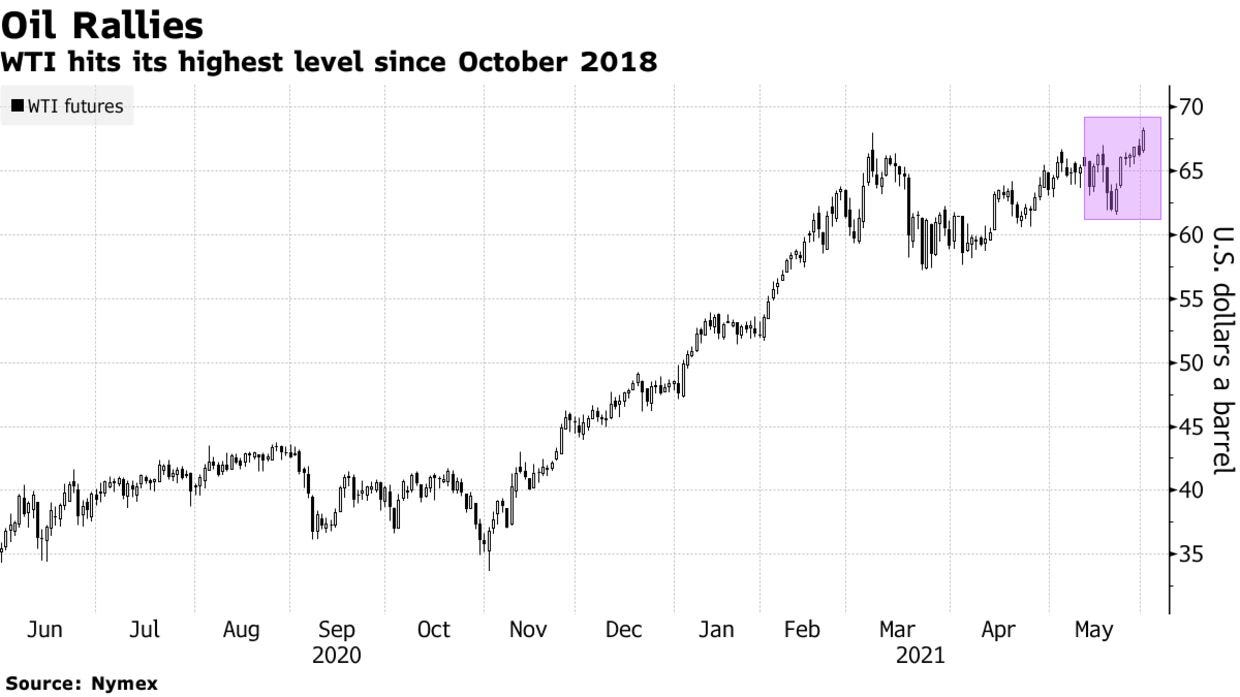Emerging Markets Daily - June 1
China Allows Three Children in Major Shift, Oil at 3 Year High, Philippines Food Juggernaut Goes Public, Rocketing S. Korea Exports, Hard-Left Rising in Peru President Race
The Top 5 Emerging Markets Stories from Global Media - June 1
China Allows Three Children in Major Policy Shift; Hopes to Slow Population Decline
BBC
“China has announced that it will allow couples to have up to three children, after census data showed a steep decline in birth rates.”
“China scrapped its decades-old one-child policy in 2016, replacing it with a two-child limit which has failed to lead to a sustained upsurge in births.”
“The latest move was approved by President Xi Jinping at a meeting of top Communist Party officials. It will come with ‘supportive measures, which will be conducive to improving our country's population structure, fulfilling the country's strategy of actively coping with an ageing population and maintaining the advantage, endowment of human resources’, according to Xinhua news agency.//”
“The cost of raising children in cities has deterred many Chinese couples. ‘If relaxing the birth policy was effective, the current two-child policy should have proven to be effective too,’ Hao Zhou, a senior economist at Commerzbank, told Reuters news agency. ‘But who wants to have three kids? Young people could have two kids at most. The fundamental issue is living costs are too high and life pressures are too huge.’” BBC News reports
Oil Hits Three Year High as Iran Deal Remains Elusive
Bloomberg
“U.S. crude futures climbed to the highest in more than two-and-a-half years after the OPEC+ alliance forecast a tightening global market, while international efforts to revive a nuclear deal with Iran were yet to reach a breakthrough.”
“West Texas Intermediate rose as much as 3.2% from Friday’s close to $68.42 a barrel, while global benchmark Brent topped $70, a level it has failed to hold for a sustained period since 2019.
The oil glut built up during the coronavirus pandemic has almost gone and stockpiles will slide rapidly in the second half of the year, according to an assessment of the market from an OPEC+ committee. A ministerial group is gathering in Vienna, before a full meeting that is expected to ratify a scheduled output increase for July.” Alex Longley reports.
Philippines' Monde Nissin Aims to Cash in on Plant-based Meat Boom
Nikkei Asia
“Philippine food juggernaut Monde Nissin debuted on the stock exchange on Tuesday after a record initial public offering that gave the company additional capital to expand its key noodle and plant-based meat segments.”
“The company, which makes the Philippines' bestselling instant noodle line, Lucky Me!, and owns U.K. meat-substitute brand Quorn, raised 48.6 billion pesos ($1 billion) in the country's biggest-ever IPO last month.”
“Nevertheless, Monde Nissin's IPO, which includes an option to sell 540 million more shares, is a boon for the PSE, historically a laggard among Southeast Asia exchanges.” Cliff Venzon reports
Korea Exports Post Biggest Gain Since 1988 as World Reopens
Bloomberg
“South Korea’s exports surged the most since 1988 in May as a reopening of overseas economies boosted demand for products manufactured by the Asian nation.”
“Overseas shipments increased 45.6% from the pandemic-driven plunge a year earlier, the trade ministry said Tuesday, compared with economists’ forecasts for a 48.9% increase. Exports to China rose 22.7% while total semiconductor shipments increased 24.5%.”
“…South Korea’s exports are seen as a useful barometer of global demand as the country is home to world-renowned manufacturers for chips, cars and smartphones and the figures are released quickly.” Sam Kim reports
Geopolitics: Hard-Left Prospect of Victory in Peru Presidential Race Chills Business - A ‘Lesser of Two Evils’ Battle
Financial Times
“Ravaged by one of the world’s worst coronavirus outbreaks, wracked by political turmoil, scarred by corruption scandals and blighted by worsening poverty, Peru will choose its fourth president in under a year on June 6.”
“Described by many observers as a choice between the lesser of two evils, the second-round run-off election pits Pedro Castillo, a rural primary school teacher turned hard-left populist, against Keiko Fujimori, the widely disliked scion of an authoritarian president who ruled in the 1990s.”
“Panic has seized the Peruvian elite at the prospect of a win by Castillo, whose political party Free Peru is led by a Marxist advocating widespread nationalisation, higher taxes, a new ‘people’s constitution’ and import substitution policies in the world’s number two copper producer. ‘Would you like to live in Cuba or Venezuela?’ ask electronic billboards along a main highway in Lima, in a reference to Castillo.”
“The sol fell to a historic low of 3.85 to the dollar last Wednesday as wealthier Peruvians rushed to dump the national currency and move their savings abroad. ‘I have not seen capital flight this bad here in two decades,’ one leading business figure told the Financial Times.”
“The roots of Peru’s deep crisis go back years. Hailed as a success story by investors, not enough of its economic growth trickled down to the poor. Successive corruption scandals destroyed faith in the political and business classes and created chronic instability, which led to Peru having three presidents in just over a week last year. When coronavirus hit, the health service collapsed amid a shortage of beds and medical oxygen.” Michael Stott reports.
What We’re Also Reading…
Geopolitics: The Taliban Say They’ve Changed. On the Ground, They’re Just as Brutal.
The Wall Street Journal
“…The Taliban, ousted from power by a U.S.-led invasion 20 years ago, are poised to expand their influence as American forces, following a pact signed in Feb. 2020, plan to leave the country later this year. The group has sought in recent months to present themselves as a responsible state actor to regional powers and the West. Indeed, some of their most-violent punishments, such as amputations for accused thieves, are used less frequently than in the 1990s as they seek to avoid alienating Afghans.”
“Yet accounts from Kamaluddin and others living under Taliban rule, as well as insurgents themselves, suggest that the group’s governance is as ruthless as ever and, with decades of experience, also more adept.”
“…The Taliban have also shown some flexibility in their application of law depending on local mores. In parts of Helmand and Kandahar, they destroy television antennas and devices that play music or video, according to residents. In the eastern province of Logar, however, those items are mostly allowed. Samandar, a 28-year-old Taliban fighter from Charkh district, said he had two smartphones.”
“We watch Turkish serials, especially ‘Osman,’” he said, referring to the historical television drama ‘Kurulus: Osman,’ about the Ottoman Empire. ‘Without it, we can’t sleep.’ He uses the internet to search Google and read news, he said. “If I can’t use the internet, it feels like I’m missing a part of my body.” Sune Engel Rasmussen reports
Telkomsel Launches First Commercial 5G in Indonesia
Jakarta Post
“State-owned telecommunication operator Telkomsel launched on Thursday the first commercial 5G service in Indonesia, thereby testing the market for such a premium data service.”
“Telkomsel president director Setyanto Hantoro said that, in the initial stage, 5G services would be made available in residential areas of Jakarta and South Tangerang given potentially high consumer demand for data services in those areas.’
“…Technology providers have been pushing the government to roll out 5G, a technology that has made its way into the 2020-2024 National Medium-Term Development Plan (RPJMN), even though local service providers have said the country has very few use cases for such high-speed connectivity at the moment.” Eisya A. Eloksari reports




